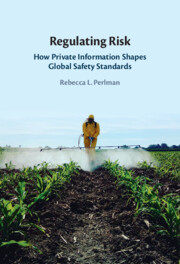Book contents
- Frontmatter
- Contents
- Figures
- Tables
- Acknowledgments
- 1 The Informational Origins of Regulatory Barriers
- 2 Private Information in the Regulation of Risk
- 3 A Theory of Regulatory Barriers
- 4 Seeking Stricter Standards
- 5 How Precaution Begets Bias
- 6 The Internationalization of Bias
- 7 Challenging Barriers
- Statistical Appendix
- Bibliography
- Index
5 - How Precaution Begets Bias
Published online by Cambridge University Press: 23 March 2023
- Frontmatter
- Contents
- Figures
- Tables
- Acknowledgments
- 1 The Informational Origins of Regulatory Barriers
- 2 Private Information in the Regulation of Risk
- 3 A Theory of Regulatory Barriers
- 4 Seeking Stricter Standards
- 5 How Precaution Begets Bias
- 6 The Internationalization of Bias
- 7 Challenging Barriers
- Statistical Appendix
- Bibliography
- Index
Summary
Chapter 5 takes a deep dive into the history of US agrochemical regulation in order to show that innovative companies were a major force behind the adoption of institutions that required the precautionary reevaluation of existing products, in opposition to generic producers who stood to lose out from such institutions. Using an original dataset that tracks changes to US agrochemical regulations over a two decade period, the chapter then provides evidence that in the wake of these institutions’ implementation, regulations have become stricter on older, less profitable products over time for reasons that cannot be attributed to health, safety, or obsolescence alone. In addition, the chapter provides evidence that the mechanism behind this outcome is not the political power of producers but rather their ability to leverage their information advantages under a regulatory regime in which products are subject to precautionary reevaluations.
Keywords
- Type
- Chapter
- Information
- Regulating RiskHow Private Information Shapes Global Safety Standards, pp. 101 - 136Publisher: Cambridge University PressPrint publication year: 2023

